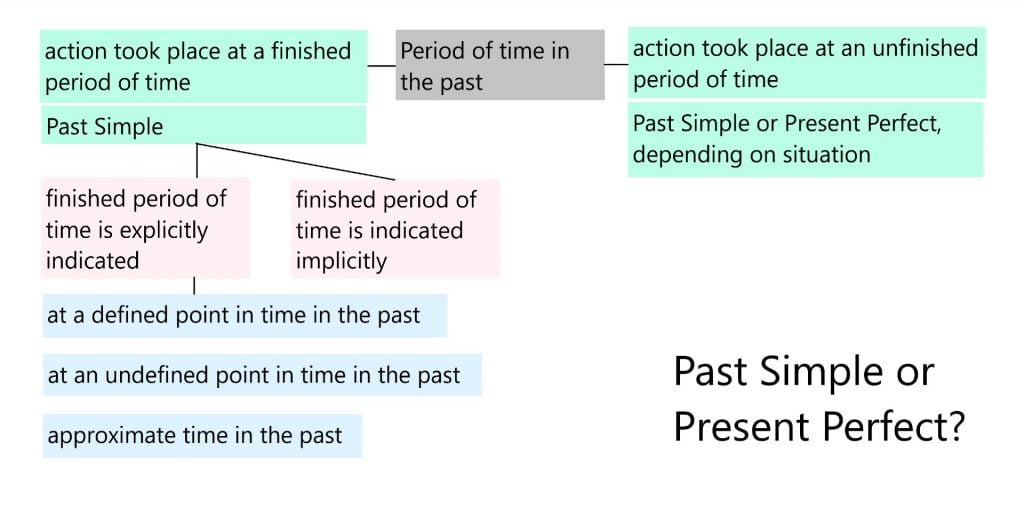We use Past Simple when a completed (started and stopped) action took place at a point in time in the past. This point in time may be in the period of time that is over like: yesterday, last year, 2 minutes ago. Also, this point in time may be in the period of time that is not over yet: today, this year.
Finished period of time
Yesterday, last week, 5 minutes ago
Unfinished period of time
Today (still ongoing), this week (this week is not over yet), now (unlike “then”) is a dynamic point in time that moves along with the present, unfinished moment in time.
Schematic diagram of the lesson:

Use of Past Simple when action took place at a finished period of time:
The finished period of time is explicitly indicated:
Note: in all these cases, we don’t use Present Perfect. This is mostly to help you choose between Present Perfect and Past Simple. (Present Perfect vs Past Simple)
Case 1
last + period of time:
last year, last time, last month, last night, last week
I went to the movies last week.
Case 2
this morning (if speaking in the afternoon and on)
This morning I went to the movies.
Case 3
a number + period of time + ago:
1 day ago, 2 months ago, 10 years ago, a year ago (a=1)
“Ago” – already tells us that this is earlier than now, which means the period of time is over. “Today,” “this year” – the time period is still going on, “last year,” “yesterday,” “1 second ago” – the time period is over.
Case 4
during + past event:
During World War 2, during his visit
Case 5
With the word “when“
The word “when” already indicates that the period of time has passed. Therefore, if we are faced with a choice whether to use the Past Simple or the Present Perfect when we have the word “when” as an indicator of time, we use the Past Simple or one of the past tenses, but definitely not Present Perfect.
When he visited (was visiting) us, he gave us this book.
So in case 5, both the verbs use a past tense. The Present Perfect is not used at all. When he (1) was visiting us, he (2) gave us this book. When he (1) came, they (2) left.
Case 6
Any other synonyms of when:
At the time, they saw…, (= when it was that time)
Case 7
in + year
In 1999, he graduated from University.
Case 8
on + day
On Monday, they went to the movies.
On the twentieth of May, they went to the movies.
Case 9
– at a defined point in time in the past:
I had my breakfast at 10 am.
Exact time is expressed by time itself.
They left the room when I came.
Exact time is expressed by another verb!
She brought a dog home 2 minutes ago.
“Ago” – already tells us that this is earlier than now, which means the period of time is over. “Today,” “this year” – the time period is still going on, “last year,” “yesterday,” “1 second ago” – the time period is over. In this example, we know that the period of time when the action was performed has ended. And also, we can define by calculation more or less accurate time when the action happened.
– at an undefined point in time in the past:
I planned to retire ages ago.
We forecasted this years ago.
– approximate time in the past:
Last week (a week ago, a year ago, last year etc.) he dreamed of becoming an astronaut, and today he wants to be a doctor.
She studied so hard last year.
The finished period of time is indicated implicitly:
Case 10
The time, when the action happened, is not indicated directly. However, indirectly, we can infer the finished period of time from the context.
Steven Paul Jobs was an American business magnate and investor. He was the chairman, chief executive officer, and co-founder of Apple Inc.
This was an example from a Wikipedia article. From the general knowledge about this legendary man, we can definitely and unfortunately say that we are talking about the period of time that has already finished. There may be different situations where you can figure out if the time period when an action happened is over.
Use of Past Simple or Present Perfect when action took place at an unfinished period of time:
This is interesting. Because we can use both Past Simple and Present Perfect to show that an action took place within the unfinished period of time.
What did you do today? (Asking about activities)
What have you done today? (Asking about results, we have used Present Perfect here)
In a nutshell:
We use Past Simple when something happened at a given point or period in time in the past (time period is over or not over), this action started and stopped.
Also on Past Simple:
